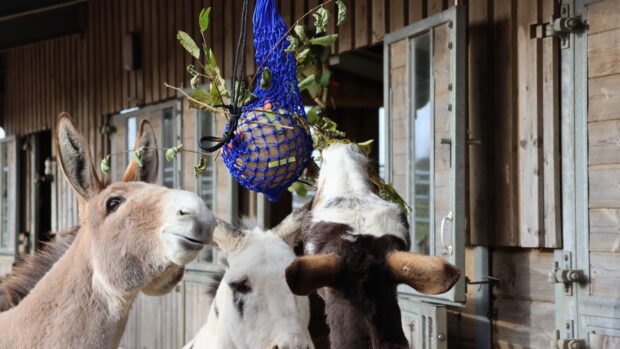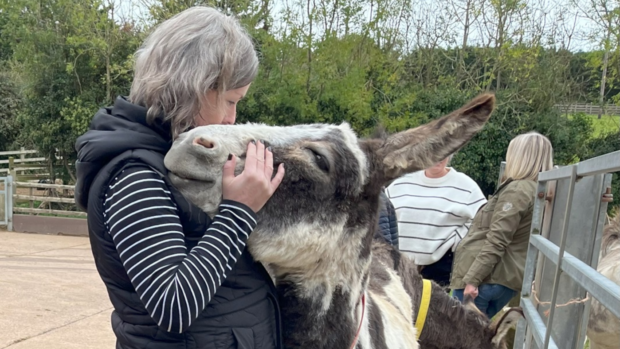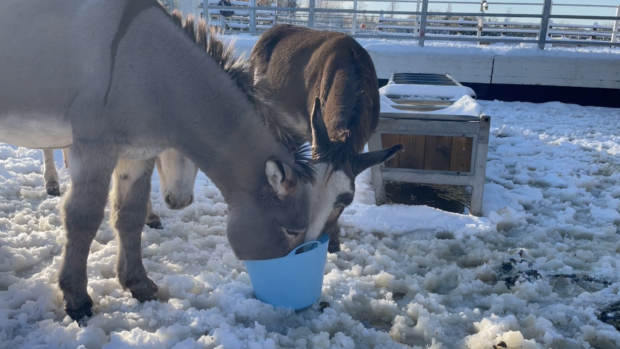A woman who ran a beach donkey business for 30 years has been sentenced after 25 equines were found living in a “neglected state”, despite the fact over £22,000 had been raised to help care for them.
Licensed donkey operator Margarite Geraldine Gibson, 77, of Netherby Close, Sleights, Whitby, who ran Whitby Donkeys on the local beach in Yorkshire, pleaded guilty to four offences under the Animal Welfare Act when she appeared at Scarborough Magistrates’ Court on 12 January.
On 24 February 2021 the RSPCA and staff from the Donkey Sanctuary attended the site at Netherby Close following concerns raised by a member of the public about the welfare of a number of equines in Gibson’s care.
RSPCA inspector Claire Little found 13 donkeys, 11 ponies and one mule in a paddock that had “many hazards”. Other mules, donkeys and ponies were “crowded together” in stables with little or no access to forage or water.
“It was apparent when looking at the stables and sheds that there was no hay and water available to the animals inside,” said Ms Little.
“There were multiple donkeys in the barn/lean-to area at the rear of the stables. The ground appeared to comprise a thick layer of straw and faeces. There was a water butt outside that appeared to be collecting rainwater. This water was not available to the animals, but they were seen straining to access it.”
Ms Little added that there were three “overcrowded” stables in a state of disrepair, held together by rope or baler twine, with wet deep-litter bedding, containing multiple animals.
“Inside the stables a number of donkeys were found to be underweight with their spines and pelvises clearly visible, while others had poor coats with lice and scabs visible on their bodies,” said an RSPCA spokesman.
“Some had other health concerns such as lameness and dental issues. Others had long overgrown hooves so were struggling to walk and others had thrush, which was so severe it was causing their feet to bleed.”
The spokesman said Gibson told Ms Little that she had struggled with veterinary care and farrier treatment owing to Covid-19. This caused her to struggle financially and a GoFundMe had previously raised £22,000. Gibson said she still had some of that money but was “trying to make it last”.
“She was offered relinquishment as an option to reduce the number of animals in her care and related costs, but declined the offer,” the spokesman said, adding that the charity advised Gibson she would need veterinary and farriery care for the equines and she was “given a chance” to improve their care and living conditions.
“Further ongoing support and help was offered but it soon became clear further intervention was needed. On a return visit it was found that no improvements had been made and there was no hay or water for the stabled donkeys and ponies. Gibson signed over 25 equines into the care of the RSPCA and the Donkey Sanctuary.”
The court heard the RSPCA, Donkey Sanctuary and World Horse Welfare had been involved with the defendant since 2016 on an “ongoing basis” in an effort to help her improve the welfare of her equids.
Gibson’s solicitor added that it was “a sad end to a very long history of working with equines for over 60 years and she had run a donkey ride business on her local beach for 30 years”.
In mitigation, the defendant’s age was taken into consideration.
She was banned from keeping animals for life and given a 14-week prison sentence, suspended for two years. She was also ordered to pay £250 costs and a £128 victim surcharge.
The spokesman said the equids are “recovering well” at the RSPCA Fell Edge centre and the Donkey Sanctuary, and will be rehomed soon.
“We often work with partner charities to tackle animal welfare issues and we are so grateful to the Donkey Sanctuary for all their wonderful work and support in this matter. It is heartening to see how well the animals now look and one went on to have a gorgeous foal too,” said Ms Little.
Hannah Bryer, head of welfare at the Donkey Sanctuary, added that in this case the needs of the animals “far outstripped” what the owner was able to provide for them.
“The situation was complex, and the welfare issues were further compounded by the large numbers of equines kept on a small site,” she said.
“Without this intervention, their suffering would have only continued. Thanks to our supporters, we have been able to provide all the donkeys and mules with a safe and secure future, either on our rehoming scheme or at one of our sanctuaries.”
You might also be interested in:

‘Seeking help would have prevented this’: message to struggling owners after suffering donkeys rescued

Mule put down and donkeys rescued after mother and son ignored welfare advice

Subscribe to Horse & Hound magazine today – and enjoy unlimited website access all year round
Horse & Hound magazine, out every Thursday, is packed with all the latest news and reports, as well as interviews, specials, nostalgia, vet and training advice. Find how you can enjoy the magazine delivered to your door every week, plus options to upgrade your subscription to access our online service that brings you breaking news and reports as well as other benefits.





